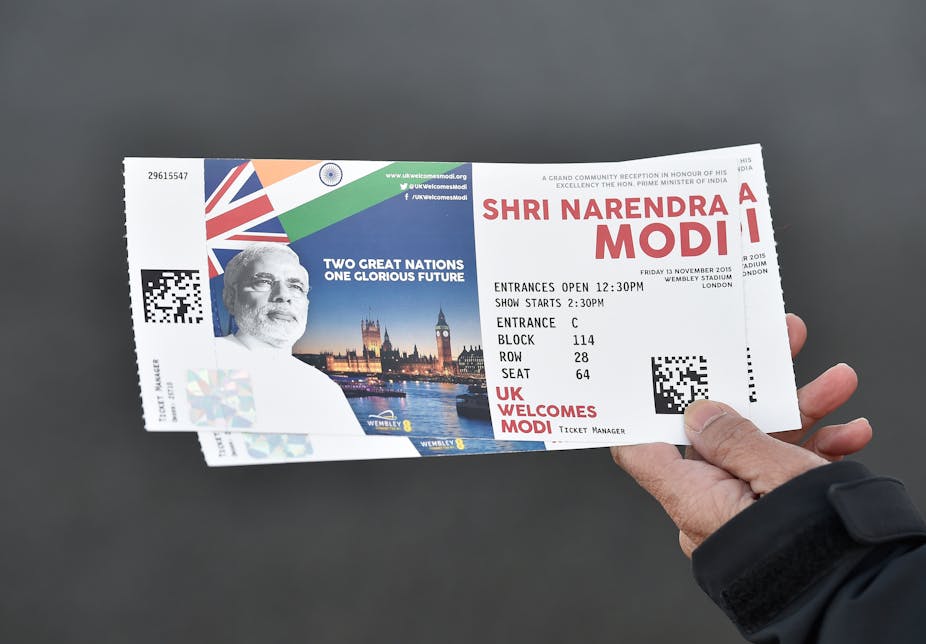Narendra Modi, the prime minister of India, touched down in the UK to an extraordinarily ecstatic welcome. Britain’s diaspora Indian community greeted him like a rock star, the highlight being a huge rally in Wembley arena with singing and dancing and tens of thousands of cheering fans.
Even by the standard of the receptions he has received in other countries, this was a momentous visit and it proceeded in good spirit. But the situation at home in India for Modi is less jubilant. Under his leadership, religious tension is on the rise – and a serious backlash appears to be beginning.
Modi has been in office for just over a year. He has already faced huge challenges on numerous economic and political fronts. Some of his favourite election promises, such as checking corruption and introducing digital governance, have been moderately successful, but he has had to retract his highly publicised land reform bill due to lack of support and farmer suicides.
His economic and development platforms, including his ‘Make in India’ program, have so far proven unsuccessful too, largely due to the counterfeit market and stiff competition from China.
But the major issue now in India is the mainstreaming of right-wing Hindu politics. At times it appears that Modi himself has little to no control over some of his supporters.
Over the year, India has witnessed a resurgence of groups espousing Hindu nationalism. The Rashtriya Swayamsevak Sangh (RSS), Vishva Hindu Parishad (VHP) and other hard-line Hindu organisations have made insensitive statements against religious minorities in India, including a call to restrict the size of Muslim families. Critics of their intolerance have been threatened with violence and one particularly prominent rationalist author has been killed.
There are also claims that Modi subscribes to Hindutva – the right-wing ideology that views the entire Indian subcontinent as belonging to the Hindus.
Communalising politics
Modi is a former RSS pracharak – a full-time worker for the cause of Hindu nationalism. This organisation has promoted a skewed representation of Hinduism that leaves no space for other religious beliefs. Its brand of religious politics has strengthened caste divisions and religious differences.
Hindu nationalists have invented a religious ritual known as ghar wapsi, or “homecoming”, to “welcome” people from other religions back to Hinduism, the “original” religion of all Indians. A narrative has been emerging of people who have been “converted” to foreign religions needing to be “re-converted” to Hinduism.
Dalits and Adivasis, as well as religious minorities, have been at the receiving end of this polarising ritual. The VHP, which organised these events has claimed huge success across the country and continues to encourage its local affiliates to carry out the ritual.

Then there is the ban on beef consumption in many states across India, which negatively affects Muslims, Christians, Dalits and beef-eating Hindus who don’t subscribe to the dominant Hindu belief that the cow is holy and should not be eaten.
Violence has erupted over this issue, resulting in the death of two people by a lynch mob, simply on the basis of a rumour that individuals had transported cows for slaughter. In the predominantly Muslim states of Jammu and Kashmir, curfews are being imposed due to the fear of violence related to beef consumption or production. Modi has made vague references to tension between Muslims and Hindus but has failed to condemn the violence.
Inconvenient truth
Not all Indians are happy about Modi’s visit to the UK. Those belonging to various religious communities and Dalit networks are organising protests against his continued silence about the violence and his apparent lack of desire to work for everybody rather than just Hindus. Through his marked silence, Modi is seen to be allowing other Hindu hardliners to take centre stage in national and international politics alienating religious and cultural minorities.
Modi is a charismatic campaigner but that won’t mean he can avoid having to answer serious questions about the tensions that have arisen under his leadership. He has already suffered a humiliating loss in regional elections in Bihar – taken by many as a sign that his grip on power is loosening.
International events such as this trip to the UK are important for shoring up support for Brand Modi back home – but beyond the pomp and ceremony, that brand is starting to look more and more tainted.

